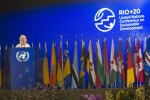 The United Nations Conference on Sustainable Development, Rio+20, concludes today with the approval of the final document, criticized by many presidents and termed by others as the best possible.
The United Nations Conference on Sustainable Development, Rio+20, concludes today with the approval of the final document, criticized by many presidents and termed by others as the best possible.
The final text was the result of a consensus reached among negotiators on Tuesday, a day before the beginning of the high-level session. It received fierce criticism by environmentalists and civil entities that called it a little ambitious, frustrating and disappointing.
The document could be changed by the heads of State or Government attending the summit, to include some demands from those environmental organizations and, even, by some statesmen.
Friends of the Earth International, one of the major grassroots-based environmental organizations of the world, stated that Rio+20’s final text “is an attack to the peoples, because it is an empty document, without concrete commitments with environment and sustainable development.”
But, officials from the United Nations and the host country have reiterated that the text approved by negotiators and which was presented by Brazil in face of the failure of three previous meeting of the Preparatory Committee is the best possible. It achieved a consensus among the different countries that discussed it.
For a good part of critics, the final text lacks the commitment by wealth countries with the financing of sustainable development’s actions, and others regret they have not raised the United Nations Environmental Program (UNEP) to the category of independent agency.
The also condemned the rejection by the United States, Canada and the European Union to the G77 plus China of creating an annual fund valued at $30 billion USD to promote sustainable development.
Cuban President Raul Castro said in his speech on Thursday that “the paralysis in negotiations and the lack of an agreement to stop global climate change are a clear reflection of the lack of political will and the inability of the developed countries to act in accordance with the obligations arising from their historical responsibility and current position.”
Raul Castro called for leaving justifications and selfishness, and seeking solutions, because this time all of us will pay the consequences of climate change.
Bolivian President Evo Morales criticized the denominated green economy as a new mechanism of subjugation of the peoples and anti-capitalist governments, and how capitalism can promote privatization and biodiversity mercantilism, and the business of genetic resources.
Ecuador’s President Rafael Correa demanded developed countries to assume a differentiated responsibility to face the environmental problem, as they are the biggest polluters of the atmosphere.
Taken from Prensa Latina
 Escambray ENGLISH EDITION
Escambray ENGLISH EDITION





Escambray reserves the right to publish comments.